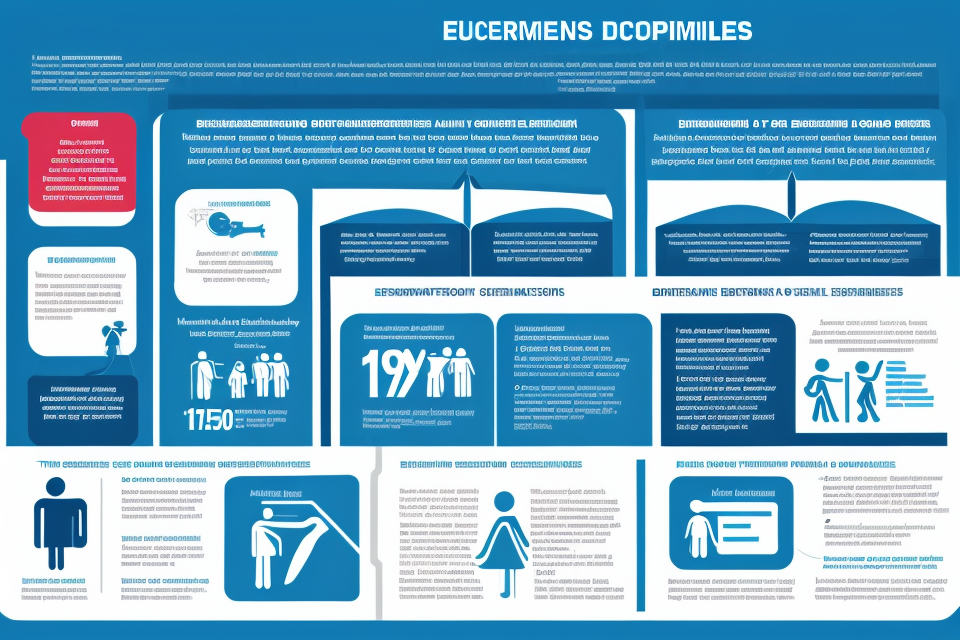
Are you curious about the proposed regulations that the government is planning to implement? Want to stay informed and be a part of the decision-making process? Finding proposed regulations from government departments is easier than you think! With a few simple steps, you can access the latest proposed regulations and have your say in shaping the future. Get ready to dive into the world of government regulations and make your voice heard!
To access proposed regulations from government departments, you can typically visit the relevant department’s website or check their social media channels for updates. You may also want to check the Federal Register, which is the official journal of the federal government and contains notices of proposed rulemaking and other government actions. Additionally, some government departments may have a public comment portal where you can provide feedback on proposed regulations. It’s important to stay informed and keep track of proposed regulations that may affect your industry or business.
Understanding the Regulatory Process
What is a proposed regulation?
A proposed regulation is a set of rules, guidelines, or standards that a government department or agency publishes for public review and comment before they become final. These regulations are designed to implement, interpret, or prescribe lawful policy or conduct with respect to a particular subject matter. Proposed regulations serve several purposes, including:
- Providing the public with an opportunity to provide input and feedback on the proposed regulations, which can help shape the final version of the regulations.
- Allowing affected parties to understand the scope and impact of the proposed regulations on their operations or activities.
- Facilitating transparency and accountability in the regulatory process by providing a clear and open mechanism for public participation.
Overall, proposed regulations play a critical role in the regulatory process by allowing government departments to engage with stakeholders and the public in a collaborative and transparent manner, ensuring that regulations are well-informed, effective, and responsive to the needs of those affected by them.
Why are proposed regulations important?
Proposed regulations are important for several reasons. They play a crucial role in shaping the future of a country and its citizens. The regulatory process helps in setting standards for various industries, protecting the environment, ensuring public safety, and promoting fair competition.
One of the main reasons why proposed regulations are important is that they provide clarity and certainty for businesses and individuals. By setting out clear guidelines and rules, proposed regulations help people understand what is expected of them and what they can expect from others. This helps to reduce confusion and uncertainty, which can be detrimental to businesses and individuals alike.
Additionally, proposed regulations are important because they help to ensure that everyone is playing by the same rules. They help to level the playing field and prevent unfair competition. By setting out clear standards and rules, proposed regulations help to promote fair competition and prevent companies from taking advantage of others.
Furthermore, proposed regulations are important because they help to protect the environment and public safety. They set out standards for industries to follow, which helps to reduce pollution and other environmental harm. They also help to ensure that products and services are safe for consumers to use.
Overall, proposed regulations are important because they help to shape the future of a country and its citizens. They provide clarity and certainty for businesses and individuals, help to ensure fair competition, and protect the environment and public safety.
Finding Proposed Regulations
Where to find proposed regulations
There are several places where you can find proposed regulations from government departments. Some of the most common sources include:
- Government websites: Many government departments publish proposed regulations on their official websites. These websites are usually run by the relevant government agency and provide access to proposed regulations that are open for public comment. You can often find links to proposed regulations on the department’s homepage or through a search function on the website.
- Federal Register: The Federal Register is the official journal of the federal government and is published daily by the Office of the Federal Register. It contains notices of proposed rulemaking, as well as other important government announcements and notices. The Federal Register is available online through the Federal Register website and is also available in print at most law libraries.
- Regulations.gov: Regulations.gov is a website run by the Office of Information and Regulatory Affairs (OIRA) that provides access to proposed regulations from a variety of government departments. The website allows you to search for proposed regulations by keyword, agency, or regulation number. You can also submit comments on proposed regulations through the website.
Tips for searching proposed regulations
- Keyword search: The first step in searching for proposed regulations is to use a keyword search. This involves using relevant keywords to find proposed regulations related to your area of interest. For example, if you are interested in environmental regulations, you can use keywords such as “environment,” “pollution,” “climate change,” etc.
- Filters and tags: After conducting a keyword search, you can use filters and tags to narrow down your search results. Filters and tags allow you to refine your search based on specific criteria such as department, date, or status. This can help you find the proposed regulations that are most relevant to your needs.
- Staying up-to-date with notifications: To ensure that you do not miss any proposed regulations that may be of interest to you, it is important to stay up-to-date with notifications. Many government departments offer email alerts or RSS feeds that can notify you of new proposed regulations. By subscribing to these alerts, you can ensure that you are always informed about the latest proposed regulations.
Understanding Proposed Regulations
Key components of proposed regulations
Proposed regulations are legal documents that outline the proposed changes to existing laws and regulations. These documents are typically issued by government departments and agencies, and are open for public comment before they are finalized. Understanding the key components of proposed regulations is essential for individuals and businesses who wish to provide input on the proposed changes.
One of the most important components of proposed regulations is the preamble. The preamble is an introductory section that provides background information on the proposed changes, including the problem or issue that the proposed regulations are intended to address. It may also include a summary of the proposed changes and an explanation of the legal authority for the proposed regulations.
Sections and subsections are another important component of proposed regulations. These sections and subsections break down the proposed changes into specific areas, making it easier for individuals and businesses to understand the impact of the proposed regulations. Each section and subsection will typically outline the specific changes that are being proposed, as well as any exceptions or exclusions that may apply.
Exemptions and exclusions are also important components of proposed regulations. These provisions specify situations where the proposed regulations do not apply, or where certain requirements are waived or modified. For example, an exemption may be provided for small businesses or non-profit organizations that would otherwise be subject to the proposed regulations.
Overall, understanding the key components of proposed regulations is essential for individuals and businesses who wish to provide input on the proposed changes. By carefully reviewing the preamble, sections, subsections, and exemptions and exclusions, stakeholders can ensure that their comments are well-informed and targeted to the specific issues at hand.
How to interpret proposed regulations
Deciphering legal language is an essential skill when it comes to interpreting proposed regulations. It can be a daunting task, but with a little guidance, anyone can learn to decipher legal language.
One of the first steps in interpreting proposed regulations is to understand key terms and definitions. These terms are often defined in the proposed regulations themselves, but they can also be found in other legal documents such as court cases or legal codes. Understanding these terms is crucial because they form the basis of the proposed regulations.
Another important aspect of interpreting proposed regulations is to be aware of common pitfalls. These pitfalls can include assuming that certain words or phrases have a specific meaning, or failing to consider the context in which a term is used. By being aware of these pitfalls, you can avoid misinterpreting proposed regulations and ensure that you understand them correctly.
Additionally, it is important to pay attention to the structure of proposed regulations. They are often organized in a specific way to help you understand their meaning. For example, proposed regulations may be divided into sections or subsections, with each section covering a specific topic. By paying attention to this structure, you can gain a better understanding of the proposed regulations as a whole.
In conclusion, interpreting proposed regulations requires a solid understanding of key terms and definitions, an awareness of common pitfalls, and a keen eye for the structure of the proposed regulations. With these skills, anyone can become proficient in interpreting proposed regulations and ensure that they are well-informed about the proposed changes.
Commenting on Proposed Regulations
Why public comments matter
Public comments play a crucial role in the regulatory process, as they provide valuable feedback to government departments before final regulations are implemented. By engaging in the public comment process, individuals and organizations can voice their concerns, provide expertise, and suggest alternative approaches to proposed regulations.
Here are some reasons why public comments matter:
- Informing policy decisions: Public comments offer insights and perspectives that may not have been considered by government departments during the proposal stage. These comments can help shape the final regulations by informing policy decisions and ensuring that the regulatory framework is more effective and balanced.
- Encouraging transparency and accountability: Public comments promote transparency and accountability in the regulatory process. By allowing stakeholders to voice their opinions, the government demonstrates its commitment to engaging with the public and ensuring that the regulatory process is inclusive and democratic.
- Influencing regulatory outcomes: Public comments can influence the final shape of regulations. If a significant number of comments raise similar concerns or suggest alternative approaches, government departments may be inclined to make changes to the proposed regulations to address these issues.
- Facilitating compliance: By providing clear guidance and addressing potential challenges early in the process, public comments can help ensure that regulations are more easily understood and complied with by the public. This, in turn, can reduce the likelihood of non-compliance and improve overall regulatory effectiveness.
- Enhancing the rule of law: Public comments contribute to the rule of law by promoting a more inclusive and participatory regulatory process. When the public feels that their voices are heard and considered, it enhances trust in the regulatory system and reinforces the principle of the rule of law.
In summary, public comments matter because they provide valuable feedback, promote transparency and accountability, influence regulatory outcomes, facilitate compliance, and enhance the rule of law. By engaging in the public comment process, individuals and organizations can contribute to the development of effective and balanced regulations that better serve the public interest.
How to submit effective comments
Submitting effective comments on proposed regulations is an important way for individuals and organizations to have their voices heard in the rulemaking process. Here are some tips for preparing and submitting effective comments:
- Preparing your comments: Before submitting comments, it’s important to carefully review the proposed regulation and understand its potential impacts. Consider the specific questions and concerns raised by the agency and how they may affect your interests. Organize your thoughts and gather any supporting evidence or data that may be relevant. It can also be helpful to review the comments submitted by others to get a sense of the issues that are being raised.
- Addressing specific questions and concerns: When submitting comments, it’s important to address the specific questions and concerns raised by the agency. This shows that you have carefully reviewed the proposed regulation and are providing thoughtful input. Be sure to clearly state the issue you are addressing and provide specific examples or evidence to support your position.
- Following submission guidelines: Each agency has its own guidelines for submitting comments, so be sure to carefully review the instructions before submitting your comments. This may include providing contact information, limiting the length of your comments, and following specific formatting requirements. Failure to follow these guidelines may result in your comments being disregarded.
Staying Informed about Proposed Regulations
How to stay informed about proposed regulations
Staying informed about proposed regulations is crucial for businesses and individuals alike, as it allows them to prepare for any changes that may affect their operations or daily lives. Here are some ways to stay informed about proposed regulations:
- Subscribing to alerts and notifications: One of the most effective ways to stay informed about proposed regulations is to subscribe to alerts and notifications from relevant government departments or regulatory bodies. This can be done through the respective websites of these departments or through third-party services that aggregate regulatory news and updates. By subscribing to these alerts, you can receive timely updates on any proposed regulations that may affect your business or industry.
- Following regulatory bodies on social media: Another way to stay informed about proposed regulations is to follow regulatory bodies on social media. Many government departments and regulatory bodies have a presence on social media platforms such as Twitter, LinkedIn, and Facebook. By following these accounts, you can receive updates on proposed regulations, as well as other relevant news and information.
- Joining trade associations and industry groups: Joining trade associations and industry groups can also be a great way to stay informed about proposed regulations. These organizations often have regulatory experts on staff who can provide updates and analysis on proposed regulations, as well as offer guidance on how to comply with them. In addition, many trade associations and industry groups offer opportunities to engage with regulatory bodies and government officials, such as through advocacy campaigns or meetings with lawmakers.
Benefits of staying informed
Staying informed about proposed regulations from government departments is essential for businesses and individuals alike. Here are some benefits of staying informed:
- Staying ahead of potential changes: By staying informed about proposed regulations, you can anticipate potential changes that may affect your business or industry. This can help you adjust your operations and strategies to be in compliance with the new regulations before they take effect.
- Being prepared for compliance: When you know about proposed regulations, you can prepare for compliance. This includes understanding the requirements of the regulations, identifying any gaps in your current operations, and developing a plan to address those gaps.
- Protecting your business interests: Staying informed about proposed regulations can help you protect your business interests. For example, if a proposed regulation would negatively impact your business, you can participate in the public comment process to voice your concerns and advocate for changes to the regulation.
FAQs
1. How can I find proposed regulations from government departments?
One way to find proposed regulations from government departments is to check the relevant department’s website. Many government departments have a section on their website dedicated to proposed regulations or rulemaking. For example, the U.S. Department of Labor’s website has a section called “Regulations, Reports and Guidance” where you can find information on proposed regulations.
2. Are proposed regulations available for public comment?
Yes, many proposed regulations are made available for public comment before they are finalized. This is an opportunity for members of the public to provide feedback on the proposed regulations. The government department will typically provide information on how to submit comments and the deadline for submissions.
3. How can I stay informed about proposed regulations?
One way to stay informed about proposed regulations is to sign up for email alerts from the relevant government department. Many departments offer email alerts or newsletters that provide updates on proposed regulations and other important information. You can also follow the department on social media or subscribe to their RSS feed to stay up-to-date.
4. Are proposed regulations available in different languages?
Some proposed regulations may be available in different languages, depending on the government department and the target audience. However, it is important to note that not all proposed regulations will be available in languages other than English. If you need assistance understanding proposed regulations in English, there are many resources available, such as translation tools or language interpretation services.
5. How can I provide feedback on proposed regulations?
To provide feedback on proposed regulations, you will need to follow the instructions provided by the relevant government department. This may involve submitting comments through a designated online portal or mailing a hard copy to the department’s address. It is important to read the instructions carefully and provide clear and concise feedback to ensure that your comments are taken into consideration.


